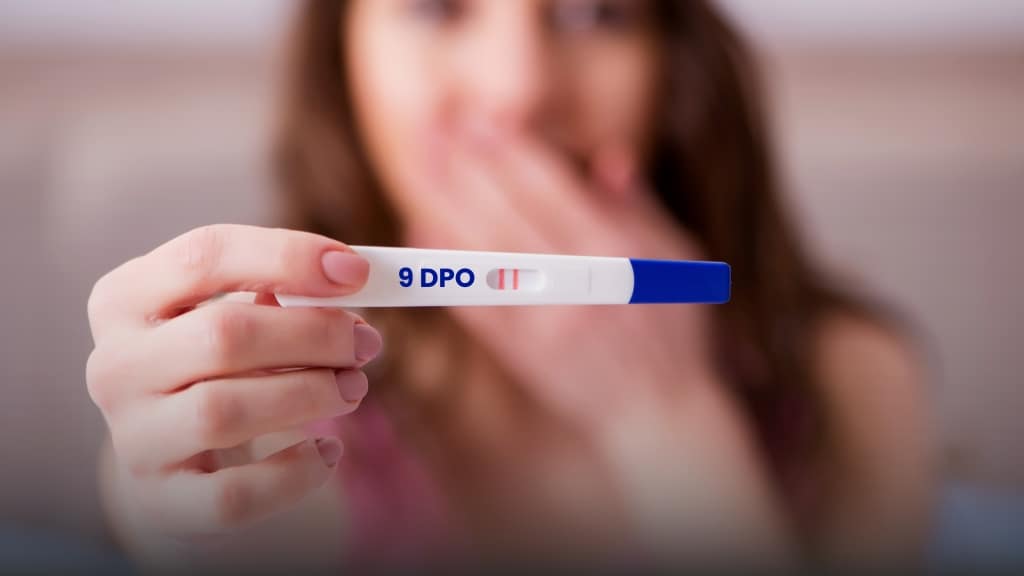
Table of Contents
Introduction: 9 DPO Pregnancy test
It can be tricky to get through the dreaded two-week waiting period before taking a pregnancy test when you’re trying to conceive. It is possible to experience symptoms and question the early indicators of pregnancy at 9 DPO, even though pregnancy symptoms are often mild at this point and many women don’t even notice them.
Every woman has a unique pregnancy and menstrual experience, but at 9 DPO, your body and hormones will change as a result of either an early pregnancy or an impending menstrual cycle. Physical symptoms and indicators are normal at 9 DPO, and this article will explain what they signify and when to test for pregnancy.
Body Changes at 9 DPO
You have entered the luteal phase of your cycle at nine days post-ovulation, and one of these two things tends to happen:
In The Case of Fertilization
Fertilization doesn’t always occur, but progesterone gets secreted to tell the uterine lining to change into an egg-friendly environment. If the egg successfully implants itself in the uterine lining, this is referred to as implantation. The pregnancy is safeguarded by the release of the hormone hCG and growing progesterone levels. Most at-home pregnancy tests measure the hormone hCG, whose production may take several days after implantation to reach levels detectable by those tests.
In The Case of No Fertilization
In the absence of fertilization, the corpus luteum, which produces progesterone, shrinks, and hormone levels fall. Menstruation is brought on by this decline in hormones, which indicates that the uterine lining is no longer required.
Your body can still be undergoing implantation at 9 DPO. In other words, the fertilized egg can still be traveling to the uterus’ wall to attach. No pregnancy test in the world will come back positive if this phase hasn’t been completed because you simply lack the necessary hormones.
9 DPO Symptoms
Since progesterone is still elevated at 9 DPO and is likely to be responsible for many symptoms at this point. These are closely akin to those you could experience before your period. Most women start to feel typical early pregnancy symptoms like exhaustion, nausea, cramps, and breast changes as a result of these hormonal changes.
Here’s a look at the 9 DPO symptoms you could experience before you get a 9 DPO pregnancy test:
1. Unusual Fatigue
Fatigue during pregnancy is one of the most typical signs of early pregnancy caused by alterations in the blood arteries that deliver oxygen to the brain as well as the energy required to construct the placenta. Even if you are getting adequate sleep, this tiredness is not letting you alone.
Although feeling tired around ovulation may be natural, feeling fatigued at 9 DPO is more likely to be an exaggerated indication of pregnancy. Very high levels of drowsiness and tiredness may be detected as early as one week into the pregnancy.
2. Nausea
Up to 80% of women report having nausea. It can start at any point in the first trimester, but if you monitor your ovulation to conceive, you may notice it sooner.
Although the specific explanation of morning sickness is unknown, hormone changes are believed to be the cause. The American Pregnancy Association estimates that 4 out of 5 women may have pregnancy-related nausea before a missed period. Pregnancy-related nausea is a typical 9 DPO symptom for many women.
3. Cramps
Early in pregnancy, 9 DPO cramping, which might resemble PMS or period pains, is extremely common. While some women may not feel anything at all, others may even experience cramps at the time of implantation.
Constipation and cramping are more likely to occur as a result of digestion slowing down when smooth muscles throughout the body, including those in the digestive system, are relaxed. Your womb is also expanding quickly at this time, which could result in painful cramps or increasing pains.
4. Tender Breasts
Your breasts will keep growing, and you might notice that your veins are getting bigger, bluer, and more noticeable. Additionally, particularly in the first trimester, you might experience general discomfort or tenderness in the area. The area may start to feel heavy, sensitive, or bloated. Along with overall breast changes, your nipples could also change their sensitivity, color, and size.
5. Spotting
Up to 30% of women report having spotting, and the blood is typically lighter in color than during a typical monthly bleed. Known as implantation hemorrhage, this can happen during the implantation process.
What If There Are No Symptoms at 9 DPO? Can a 9 DPO Pregnancy Test Still Be Effective?
At nine days post-ovulation, a pregnancy test may come back negative before turning positive a few days later. Only fewer than 10% of the pregnancy charts examined in one investigation into this revealed a positive test result at 9 DPO. You just need to wait longer before testing if you haven’t experienced any signs at 9 days after ovulation.
A Final Word on 9 DPO Pregnancy test
What is BFP at a 9 DPO Pregnancy Test?
10% to 20% of pregnancies end in a miscarriage. A gush of brown vaginal discharge is a symptom of an impending miscarriage. There are other signs too such as
- Fainting
- Dizziness
- Passing tissues
- Passing blood clots
- Lower abdominal pain or cramping
What is BFN at 9 DPO Pregnancy Test?
A 9 DPO BFN merely indicates that it is too early to determine whether you are pregnant or not. Even if you are pregnant, you may still experience a BFN at 9 DPO since hormone levels may not have increased enough for home tests to detect them. It’s preferable to wait at least 3 days after receiving a BFN before trying again.




